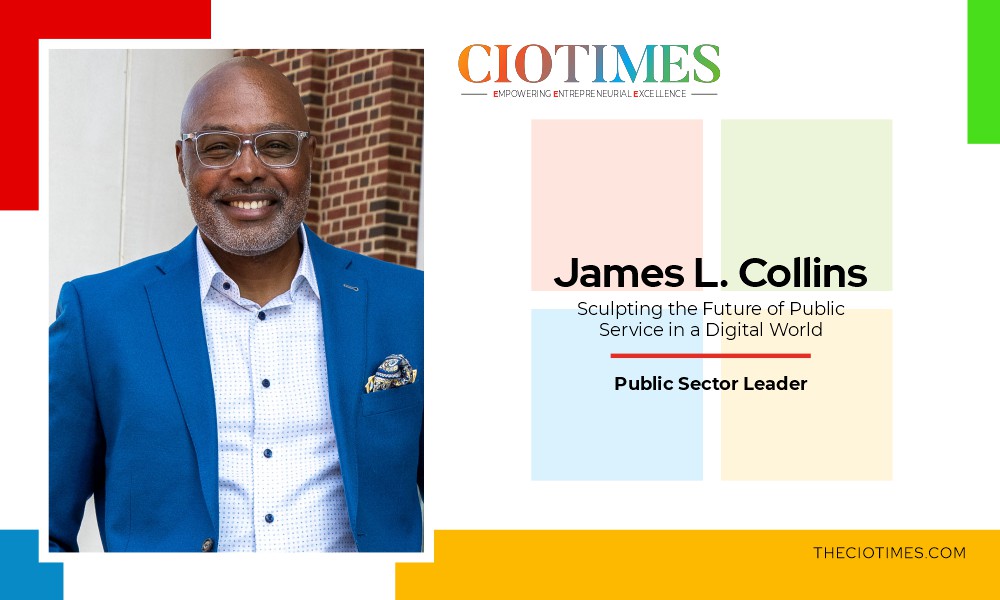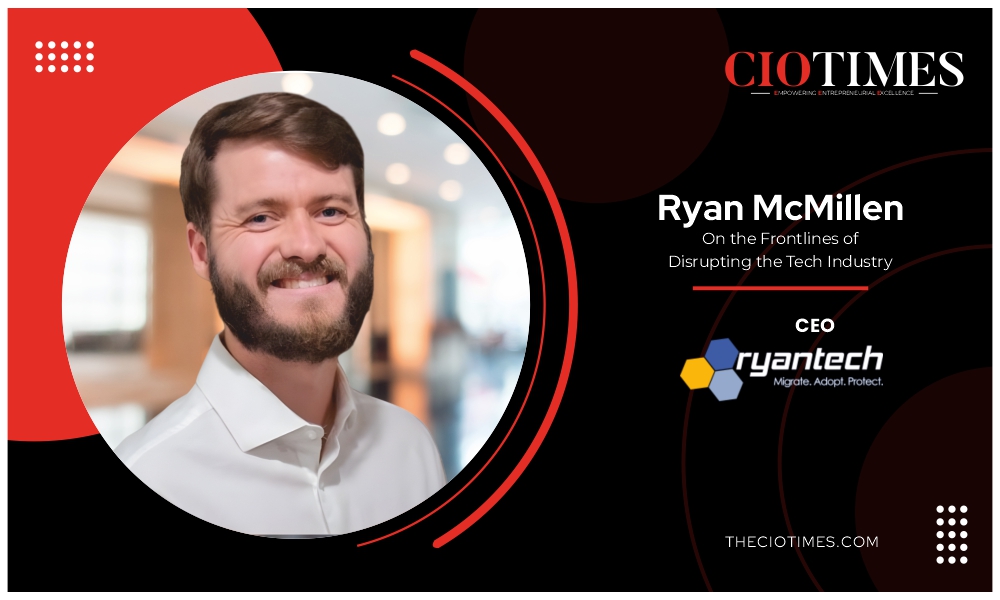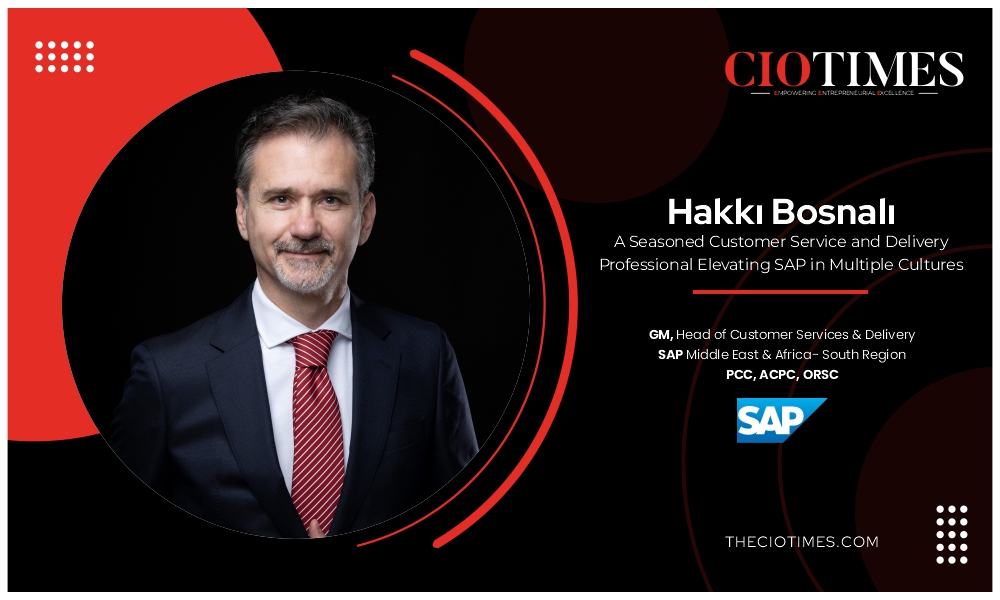In the ever-evolving landscape of business, it is crucial not just to embrace change, but to drive it forward.
Imagine a leader who, when faced with formidable challenges, doesn’t merely address issues but reimagines entire systems. This leader inspires others to transcend boundaries and pursue the seemingly unattainable. This is the essence of transformational leadership: not just embracing change, but propelling it, nurturing curiosity, valuing diverse viewpoints, and envisioning a future shaped by the synergy of advances and human ingenuity.
James Collins, the Public Sector Leader for the Americas at Microsoft, embodies this transformative leadership.
James has dedicated his career to revolutionizing public sector organizations, building collaborative teams, and leading through the complexities of digital transformation that ensures technology serves as a powerful tool for societal progress. His work goes beyond reimagining systems; it’s about reshaping the way government interacts with its residents.
Let’s embark on a journey through James’s story, exploring the principles, challenges, and triumphs that characterize a leader who is both a product of the digital era and an influencer in its evolution.
A Leadership Legacy Defined by Public Service and Innovation
James’s journey is a compelling story of service, innovation and partnership. Over the span of more than three decades, James has meticulously crafted a brand rooted in these principles. His deep understanding of government, coupled with his intentional collaboration and advocacy for team members, has set him apart as a beloved and visionary leader. James doesn’t just navigate the complexities of his field; he redefines them with empathy, always with an optimistic outlook and maintaining a servant’s heart. His story is one of humble yet relentless dedication, inspiring others to look beyond the present and drive meaningful progress.
James began his professional journey in the United States Air Force, where he served for over eight years during the Gulf War, including Desert Storm and Desert Shield. His time in the military was more than service; it was a foundation that instilled in him a sense of discipline, resilience, and a commitment to serving others, while also sparking his passion for continuous process improvement. These values would later become the cornerstone of his leadership philosophy.
After leaving the Air Force, James transitioned into the state government in Delaware, taking on roles that would inspire his career in technology. In his first major position he was tasked with finding and implementing a system to manage Delaware’s fleet assets. This experience sparked a passion for technology and process reengineering, a drive that would go on to define his career over the following decades.
Throughout his service in Delaware, James held a series of progressively influential roles. Each position enabling him to make a more significant impact on the state’s technological landscape. From managing the state’s licensing agency as Director of Professional Regulation to serving as the Deputy Secretary of State, James showcased a natural talent for bringing together the right teams and seamlessly integrating technology with essential services, enabling government to better serve constituents.
His tenure as Chief Information Officer (CIO) for Delaware marked a defining moment and the pinnacle of his public career. In this role, James was entrusted with overseeing the state’s IT strategy, infrastructure, and cybersecurity. Under his leadership, he spearheaded transformative initiatives that significantly reshaped the state’s trajectory. From driving the digitization to launching a groundbreaking open data portal, his efforts didn’t merely modernize operations; they revolutionized transparency and accessibility, making the state more open and connected to residents than ever before. According to James, one of the most challenging yet rewarding aspects of his CIO role was navigating the state through the Great Pandemic. The societal lockdowns required difficult choices, extensive collaboration with all branches of government, and a resilient leadership approach to utilize technology to sustain critical services. James’s ability to successfully navigate the state through turbulent times stands as a powerful testament to his exceptional leadership and unwavering commitment to public service.
Embracing Challenges and Opportunities
Leadership, especially in the public sector, comes with its own set of challenges. James has faced these hurdles head-on, turning them into opportunities and navigating the nuances of government while driving innovation. He embraces ambiguity, enjoying the process of metamorphosis. James firmly believes that authentic leadership hinges on the ability to empathize deeply with people. By combining this profound empathy with a compelling vision, he has cultivated a leadership style that inspires and propels meaningful change.Top of Form
Bottom of Form
James often emphasizes the importance of active listening to the people on the front lines, those directly involved with customers. By prioritizing this approach, he ensures that his leadership decisions are informed by the realities on the ground, making them more effective and impactful.
The Microsoft Chapter
James’s transition to the private sector, specifically to Microsoft, was a natural progression for a visionary who had spent his career driving technological innovation in the public sector. James initially took on the role of General Manager for the State and Local practice, where he was responsible for helping customers nationally with deploying cloud computing and other digital tools.
His success in this role led to his current position as the Public Sector Leader for the Americas, in which he and his team of government experts support Microsoft’s efforts to empower organizations across the continent.
James’s work at Microsoft is driven by a deep understanding of the challenges that agencies face, as well as a commitment to helping these organizations harness the power of technology to better serve their constituents.
One of the key initiatives that James has championed at Microsoft is the integration of artificial intelligence (AI) into government systems. In our interview, he shared his excitement about introducing customers to this revolutionary technology and encouraging them to embark upon the journey to usher in the next evolution of services. Over the past year and a half, he has been working closely with leaders to reimagine their work with AI. This includes helping them understand the risks and benefits of AI, developing policies to guide responsible AI practices, and creating road maps for implementation. “The goal is to make services more efficient, accessible, and personalized for constituents,” says James.
James is particularly passionate about leveraging AI to create an intuitive and intelligent experience for constituents, ensuring that they can access the services they need anywhere, anytime and from any device, without having to navigate complex bureaucracies. This focus on the customer reflects James’s broader principle, which emphasizes the importance of understanding and meeting the needs of the people being served. He is firmly convinced that AI will allow organizations to address historically intractable issues and achieve greater outcomes.
The Philosophy of An Exemplary Leader
Beyond his professional accomplishments, James is a leader who purposefully creates time for personal growth and lifelong learning. He is a firm believer in the power of mentorship and is constantly seeking opportunities to learn from others, whether through formal mentorship programs, reading leadership books, or observing how other leaders operate. He is also passionate about mentoring the next generation of leaders, sharing his insights and experiences to help them succeed in a rapidly changing world. Through his service on the boards of the Boys & Girls Club and Delaware State University, he relishes the opportunity to contribute to environments that nurture tomorrow’s leaders.
During the interview, James shared some of his personal reflections on leadership. He emphasized the importance of being curious and maintaining a growth mindset. “Earlier in my career, I assumed I fully understood the problem and the best solution. But I’ve learned that being curious and asking questions can lead to more fulsome conversations, relationships and results,” James recalls. This curiosity is something he encourages in his team as well, fostering an environment where everyone feels safe to contribute their ideas and perspectives.
James also believes that appreciating the personal and professional challenges that his team members face is crucial to being an effective leader. He underscored the need for leaders to be flexible and supportive as their teams balance personal and work priorities. This empathetic approach not only builds trust but also empowers his team to perform at their best.
Another key aspect of James’s leadership philosophy is his focus on conscious inclusion. He is committed to building diverse teams and creating an environment where everyone feels valued and included. He believes that anything is possible when the right people operate in a culture that allows them to be their authentic selves and contribute their superpowers to the work. By fostering a positive atmosphere, creativity thrives, and team members are motivated, engaged, and productive.
He shared an anecdote from a recent hiring process, where he had to choose between several highly qualified candidates. In making his decision, James considered not only the technical skills of each candidate but also how they would contribute to the diversity and culture of the team. This commitment to inclusivity reflects his broader belief that diverse teams are more innovative and effective.
A Testament to Impact
James’s contributions have not gone unnoticed. He has received numerous awards and accolades throughout his career, reflecting his impact on both the public and private sectors.
Among these awards are the National Association of State Chief Information Officers (NASCIO) Meritorious Service Award and the StateScoop Executive of the Year Award. These awards are a testament to James’s ability to lead with vision, empathy, and a deep commitment to service.
In addition to these awards, James was also the recipient of the Order of the First State from the Governor of Delaware, a rare honor that recognizes his meaningful contributions to the state. This award held special significance for James, as it recognized the influence of his efforts on the community, especially in areas like child protection, addressing the opioid crisis, and building partnerships with agencies to promote digital government.
James’s six-year tenure as the CIO of Delaware, a role in which the average tenure is just 26 months, also stands as a testament to his dedication to the evolution of constituent services. During this time, he not only led the state’s IT strategy but also played a key role in shaping national discussions around cloud computing and cybersecurity through his work with the National Association of State CIOs, where he served as president during the organization’s 50th anniversary.
Envisioning a Future of Transformative Change
Looking ahead, James is energized by the prospect of technology reshaping the public sector. He sees AI as a particularly powerful tool that can help organizations not only improve but also create more meaningful and curated experiences for their constituents.
James is mindful of the challenges that come with this new era of technology. He believes that leaders must be thoughtful and deliberate in how they implement AI and other technologies, ensuring that they are used in ways that are truly beneficial. Achieving this necessitates a profound grasp of AI, dedication to ethical leadership, robust collaborations between public and private sectors, and an emphasis on the enduring effects of technological advancements.
For James, modern leadership goes beyond technology. It’s about fostering a culture of innovation and adaptability, where leaders are encouraged to challenge the status quo and teams are empowered to think creatively and collaboratively. It’s about building organizations that are not only efficient and effective but also responsive to the needs of the people they serve. He believes there is a real opportunity to adopt a new approach to deploying technology in government that puts the constituent at the center.
A Legacy of Service and Innovation
James’s career is a luminous example of the power of service, innovation, and inclusive leadership. From his early days in the Air Force to his current role at Microsoft, James has consistently demonstrated a commitment to using technology to positively impact society. His contributions have revolutionized the way governments function, gather insights to tackle issues, and address people’s needs.
As he continues to lead Microsoft’s efforts to empower public sector organizations across the Americas to achieve more, James remains grounded on the same principles that have guided him throughout his career: a deep commitment to service, a passion for innovation, and a belief in the power of inclusion.
James Collins exemplifies servant leadership. It’s inspiring to see someone prioritize empathy, humility, selflessness, vision, and empowerment in government policy, corporate strategy, and modernization. In a time when every facet of our existence is evolving, leaders like James Collins are pivotal to ensuring these changes are harnessed for the greater good of the world and its people.




